Hybrid & EV Battery Warranty Guide: What You Need to Know
February 14, 2022
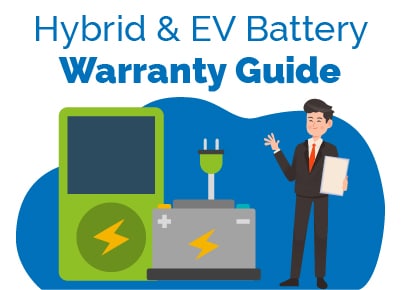

I am a serial entrepreneur and a consumer advocate. When I’m not helping car buyers, I love working on ventures that have a positive impact.
I run a cause marketing agency and serve on the board of Vayu Global Health where we are disrupting the medical industry and preventing the needless deaths of mothers and babies during childbirth.
Manufacturers provide bumper-to-bumper coverage for their new vehicles, but this does not include hybrid or EV parts.
Fortunately, manufacturers also provide distinct hybrid and EV coverage for those unique parts, including the batteries.
How do these electric and hybrid vehicle warranties work?
Table of Contents
- What Is a Hybrid & EV Warranty?
- Federal Regulation for Electric Car Battery Warranty
- Hybrid Battery vs. All-Electric Battery
- What Is Percentage Guarantee for Electric Car Warranty?
- Should I Get an Electric & Hybrid Battery Warranty?
- Best EV & Hybrid Battery Warranties
- Best EV Deals by Type
- Frequently Asked Questions
Learn more about the stats and trends of the car warranty industry >>
What Is a Hybrid & EV Warranty?
Manufacturers provide factory or extended warranties on their new cars. However, many also include Hybrid and EV warranties, which cover unique components that hybrid and EV vehicles have.
Most often, a Hybrid/EV warranty will cover all of the same components as the factory warranty with additional coverage for the unique parts.
What Is Covered in a Hybrid & Electric Vehicle Warranty?
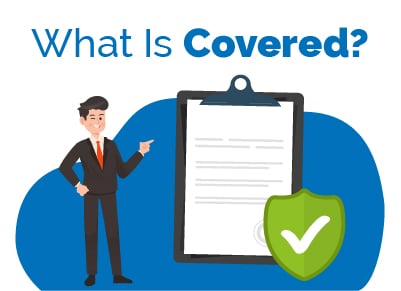
HEV (Hybrid Electric Vehicle) warranties cover the parts unique to these kinds of vehicles. For example, they may cover:
- HV Battery
- Battery Control Module
- Hybrid Control Module
- Powertrain Coverage
- Emissions Coverage
What Is Not Covered in a Hybrid & Electric Vehicle Warranty?
The list of items not covered is similar to the exclusions listed in most extended warranty plans. These warranties will not cover:
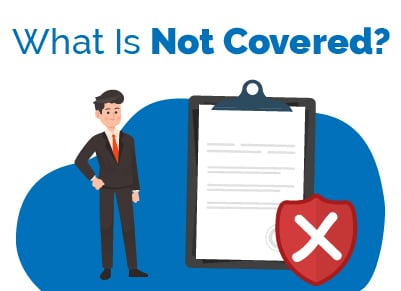 Non-Standard Charging
Non-Standard Charging- Damage from Installation of Non-Approved Parts
- Battery from Opening the Battery Coolant Reservoir
- Maintenance Failure
- Accident Damage
- Damage from Weather
- Vehicle Vandalism
- Normal Wear and Tear
- Vehicle Interior
How Long Do Electric Car Batteries Last?
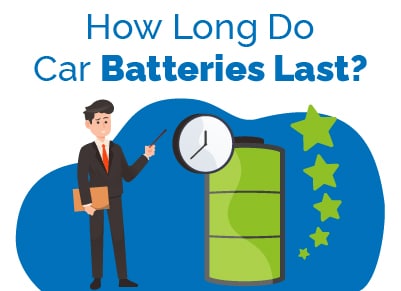 Electric car batteries are known for being long-lasting. Oftentimes, they can last up to 10 years.
Electric car batteries are known for being long-lasting. Oftentimes, they can last up to 10 years.
Of course, you should still ensure the vehicle has a high-quality battery from a reputable brand. The top three electric car battery makers are:
- Contemporary Amperex Technology Co. - Supplies Honda, Stellantis, BMW, Dongfeng, Tesla, Volkswagen Group, Volvo Car Group.
- LG Energy Solution - Supplies General Motors, Tesla, Volvo, VW, Stellantis
- Panasonic - Supplies Tesla and Toyota
How Much Does Replacing an EV Battery Cost?
It’s a good thing that electric car batteries last so long because they are quite expensive to replace. The average cost for replacing an EV battery is $5,500!
EV batteries are some of the most expensive parts of an EV. If you have to replace it out of warranty, then you can expect to spend thousands of dollars.
Related: Check out AutoZone's battery warranty for non-hybrid and electric options
Federal Regulation for Electric Car Battery Warranty
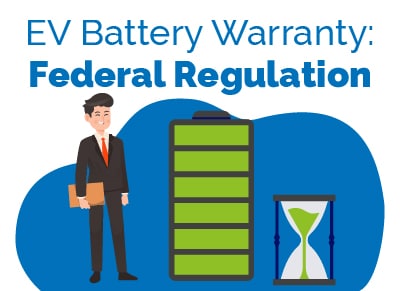 There are still many EV tax credits and rebates available, and one bonus you get with an EV purchase is the federal regulation for EV car battery warranties.
There are still many EV tax credits and rebates available, and one bonus you get with an EV purchase is the federal regulation for EV car battery warranties.
The federal regulation requires that manufacturers cover the EV battery for at least eight years under the factory warranty. This serves as a huge incentive for purchasing EVs, as it gives car buyers the peace of mind that they won’t be accountable for such an expensive part for at least the first 8 years of vehicle ownership.
California Zero Emission Vehicle Program
In addition to EV tax credits & rebates, there’s also California’s Zero Emission Vehicle Program. The state’s goal is to reduce emissions long-term and to do this, they require manufacturers to provide a certain number of battery-electric, hydrogen fuel cell, and plug-in hybrid vehicles. The state provides credits to the auto manufacturers for the qualified vehicles they produce.
Hybrid Battery vs. All-Electric Battery
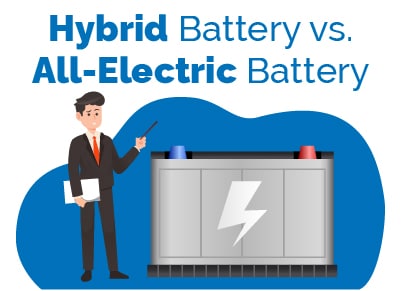 Many warranties include hybrid and EV batteries, but there are some differences to note between the two.
Many warranties include hybrid and EV batteries, but there are some differences to note between the two.
For one, in a hybrid, both the gas engine and electric battery work together. Therefore, hybrids do not require as much energy from the battery, so the batteries are often (up to 10 times) smaller than EV batteries. For example, the total energy capacity of the Ford F-150 hybrid is 1.5 kWh, and the Ford Escape PHEV is 14.4 kWh. Compare that to the 99.0 kWh capacity of the Mustand Mach-e Extended Range.
Both types of batteries are expensive to replace. However, hybrid battery replacement costs can vary drastically, from $1,000 to $6,000. EV batteries also cost thousands to replace, though the total cost may reach as high as $20,000.
Additionally, EV batteries tend to last roughly a decade, whereas hybrid batteries may be able to last the entire vehicle’s lifetime. Still, both types will degrade over time and run the risk of failure.
What Is Percentage Guarantee for Electric Car Warranty?
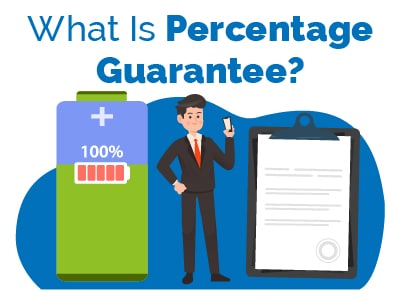 Car manufacturers also offer a percentage guarantee for their EV car batteries. All rechargeable batteries degrade over time. The Percentage Guarantee ensures that the battery won’t degrade past a set percentage of the original capacity during the warranty period. If the battery does degrade past the percentage in the guarantee, then the manufacturer will replace it.
Car manufacturers also offer a percentage guarantee for their EV car batteries. All rechargeable batteries degrade over time. The Percentage Guarantee ensures that the battery won’t degrade past a set percentage of the original capacity during the warranty period. If the battery does degrade past the percentage in the guarantee, then the manufacturer will replace it.
Imagine that a given manufacturer offers an 8-year/100,000-mile warranty on the battery with a Percentage Guarantee of 75%. If the battery capacity slips below 75% of the original capacity during the initial warranty, then you will get it replaced for free. In this example, if the original battery capacity is 300 miles, then the warranty ensures you get at least 225 miles from a full charge for 8-years/100,000 miles.
Note that there is not a universal standard for the Percentage Guarantee. You must carefully review the warranty to find out what percentage yours offers.
Should I Get an Electric & Hybrid Battery Warranty?
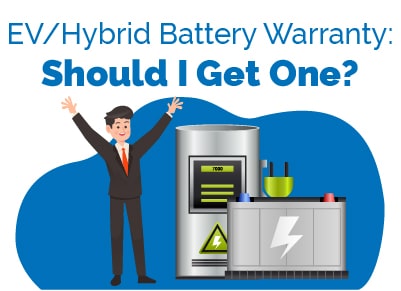 New electric and hybrid vehicles include a factory warranty for EV/Hybrid parts (like the battery). You should always check with the dealership to determine what the factory warranty covers.
New electric and hybrid vehicles include a factory warranty for EV/Hybrid parts (like the battery). You should always check with the dealership to determine what the factory warranty covers.
If you purchase a used EV from the dealership, inquire if it is still in warranty. Beyond that, you should speak with the dealership about any extended options they may offer for EVs and hybrids.
Ultimately, you won’t need to “get” an EV or hybrid battery warranty most of the time because the original warranty lasts for many years. However, if the factory warranty is coming to an end, you should consider extended options given the high cost of replacing the battery.
Best EV & Hybrid Battery Warranties
Who Has the Best Hybrid Battery Warranty?
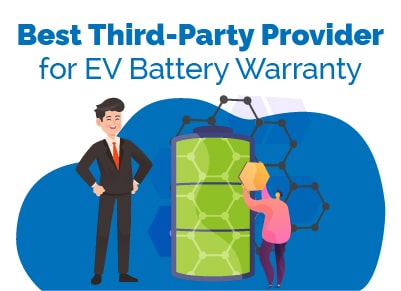 CarEdge [Review] offers extended warranty coverage for electric and hybrid batteries. They have coverage plans that will cover the latest technology in your vehicle.
CarEdge [Review] offers extended warranty coverage for electric and hybrid batteries. They have coverage plans that will cover the latest technology in your vehicle.
Endurance [Review], another top third-party warranty provider, does not offer warranty coverage for EVs (yet). Instead, they provide Endurance Advantage, which covers routine maintenance and includes extra benefits. It can help EV/Hybrid owners manage maintenance costs.
Right now, EV and Hybrid battery warranties aren’t as common for third-party providers. They are relatively new, and many are just beginning to add these options. Be sure to inquire with multiple third-party providers about the EV/Hybrid coverage they provide and to see if your vehicle qualifies. Check out our best picks for third-party warranty providers here >>
Which Models Have the Longest EV & Hybrid Battery Warranty?
- Tesla Model S and X: 8-years/150,000 miles
- Tesla Model 3: 8-years/ 100,000 miles
- Audi e-Tron: 8-years/ 100,000 miles
- Mercedes-Benz EQC: 5-years, unlimited mileage for the 12-volt battery
- Nissan Leaf: 8-years/100,000 miles
- VW ID.4: 8-years/100,000 miles
- Ford Mach-e: 8-years/ 100,000 miles
Electric & Hybrid Car Battery Warranty by Manufacturer
- Nissan: 8-years/100,000 miles, with 75% percentage guarantee
- Chevrolet: 8-years/100,000 miles, with 60% percentage guarantee
- Tesla: 8-years and 100,000-150,000 miles (depending on model), with 70% percentage guarantee
- Toyota: 10-years/150,000 miles, no percentage guarantee stated
- Honda: 8-years/100,000 miles, no percentage guarantee stated
- Ford: 8-years/100,000 miles, no percentage guarantee stated
- GM: 8-years/100,000 miles, no percentage guarantee stated
- Hyundai: 10-years/100,000 miles
- Kia: 10-years/100,000 miles
- BMW: 8-years/ 80,000 miles
- Volkswagen: 8-years/100,000 miles
Best EV Deals by Type
Frequently Asked Questions
How long is an EV & Hybrid battery warranty?
The Federal Regulation for Electric Car Battery Warranties requires that manufacturers provide coverage for batteries for a minimum of 8 years. Therefore, most EV and hybrid battery warranties are 8-10 years and 100,000 miles or more (whichever comes first).
What should I do if I experience EV battery failure?
First and foremost, make sure you know your warranty coverage at all times. This will help guide your actions if you experience EV battery failure. If you do, then you may need to jump-start the car to turn it on. If you are able to do this, then you should drive the car to an approved auto shop for assessment. If the battery did indeed fail, you should report it to your warranty provider. You may need to pay a deductible depending on your coverage.
Which electric car has the best EV battery warranty?
Thanks to federal regulation, manufacturers are required to cover an EV battery for at least eight years. Therefore, most factory warranties for EV batteries are fairly similar. Tesla models S and X have some of the best EV warranties with eight years or 150,000 miles.
Which hybrid car has the best EV battery warranty?
Toyota recently extended its hybrid battery warranty to 10 years or 150,000 miles.
Which plug-in hybrid model has the best EV battery warranty?
The 2022 Hyundai Santa Fe has a very strong plug-in Hybrid/EV warranty of 10 years or 100,000 miles.
Who has the best EV extended warranty?
To find out about EV extended warranty terms, you must request a quote from the provider. Inquire with your manufacturer dealership about EV extended warranties, and also check with third-party providers.
Which models have the best car battery?
The Mercedes EQS has the best EV battery, with 107.8 kWh capacity and 453-miles of range. The Tesla Model S is a close runner-up with 405 miles.
What is the lifespan of an electric car battery?
Well-made EV car batteries often last up to 10 years.
Posted in Car Buying Tips, Car Warranty |
- Car Extended Warranty Guide
- Different Types of Car Warranties
- What's the Deal with Extended Warranties in California?
- Hybrid & EV Battery Warrranty Guide
- Best Warranty Provider Comparison
- Calculate Extended Warranty Cost
- What Can Void a Car Warranty?
- Interesting Car Warranty Statistics
- How to Stop Car Warranty Calls







